|
“Out!” – In Africa
by Karen Blixen1
“If I know a song of Africa … does Africa know a song of me? Will the
air over the plain quiver with a colour that I had on, or the children
invent a game in which my name is …?”
Was I being self-indulgent when I wrote that?
Perhaps I was. Or
perhaps I was just a little bit jealous of Major Henri De Beaujolais.
Because at Nine Crocodiles Bay on the banks of the Lumbago, the
children still sing of him, and they have invented a game in which his name
is.
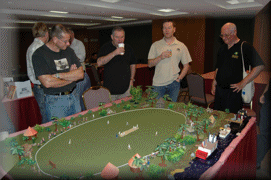 Henri is my friend, and is a man determined to bring the blessings of
civilization wherever he goes.
In this endeavour he has had to endure many set backs on the way to many
satisfying accomplishments. But
of all his hard fought victories over noble foes, and all his contributions
to the well-being of those in need, I know, that deep in his half-French,
half-English, Eton educated, heart there is one achievement that he holds
especially dear… for Henri organised The First Equatorial Test Match. Henri is my friend, and is a man determined to bring the blessings of
civilization wherever he goes.
In this endeavour he has had to endure many set backs on the way to many
satisfying accomplishments. But
of all his hard fought victories over noble foes, and all his contributions
to the well-being of those in need, I know, that deep in his half-French,
half-English, Eton educated, heart there is one achievement that he holds
especially dear… for Henri organised The First Equatorial Test Match.
Denys Finch-Hatton and I were on the porch of my farm in Africa, at the foot
of the Ngong Hills, listening to the adagio of the Mozart clarinet concerto
when the invitation arrived2.
Denys had been to school with De Beaujolais, who had rather
charmingly, stuffed his “Rest of the World” cricket team with other
old-Etonians3.
Within minutes we were packed for extended safari and en route across the
breadth of Darkest Africa from Nairobi, British East Africa, to Nine Dragons
Bay, Protectorate Francais de L’Effluent et Lumbago.
The journey was long and tedious, or may be it just seemed like that
as Denys tried to teach me the rules of the game of cricket…
When we arrived all of Nine Dragons Bay was en fete.
The local tribes, the Fukawi, the Lobotomy, and the “Rascally Rugga
Rugga” (wonderful alliteration that, I must remember to use it in one of my
stories), had turned out to marvel at the unusual sight of the white folks
at peace and at play.
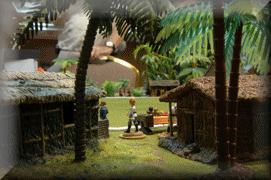 Henri was there of course, with his Legionnaires; along with the French
Consul General, the debonair Maurice Derriere, and also the coquettish
Mademoiselle Fifi Le Bonk who seemed to be going to great lengths to bring a
little warmth and companionship to the lives of the soldiers.
Captain Michael Stick had brought a British and Sikh contingent.
A charming but single-minded young man, he reminded me of Gonville,
the nice captain we met in Natal.
A rather rough American contingent was led by an even rougher Major
William Holdem. The Germans
were present and I had been warned about their commander, Herr Von Stomp,
but he must have been on his best behaviour because I found him rather sweet
and he even arranged a little party for the French other ranks.
On the civilian side the Arabs had come up river to trade and Sir
Hector Brandon was on his way downriver with the proceeds of his latest
safari. An American heiress,
Mary Vandenberg, and her maid were also on a visit.
It may be the romantic in me but I detected a little frisson between
Henri and Mary. The way that
they refused to acknowledge the “elephant in the tent”, as we say in Africa,
was obvious to all but them. Henri was there of course, with his Legionnaires; along with the French
Consul General, the debonair Maurice Derriere, and also the coquettish
Mademoiselle Fifi Le Bonk who seemed to be going to great lengths to bring a
little warmth and companionship to the lives of the soldiers.
Captain Michael Stick had brought a British and Sikh contingent.
A charming but single-minded young man, he reminded me of Gonville,
the nice captain we met in Natal.
A rather rough American contingent was led by an even rougher Major
William Holdem. The Germans
were present and I had been warned about their commander, Herr Von Stomp,
but he must have been on his best behaviour because I found him rather sweet
and he even arranged a little party for the French other ranks.
On the civilian side the Arabs had come up river to trade and Sir
Hector Brandon was on his way downriver with the proceeds of his latest
safari. An American heiress,
Mary Vandenberg, and her maid were also on a visit.
It may be the romantic in me but I detected a little frisson between
Henri and Mary. The way that
they refused to acknowledge the “elephant in the tent”, as we say in Africa,
was obvious to all but them.
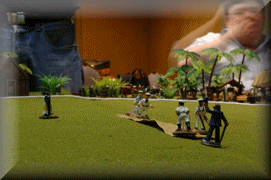 I have to admit that the catering was jolly good, Wensleydale cheese and
scones with jam and cream was a rare treat for the tummy.
Henri gave a little speech4, quoting from that promising
new poet Henry Newbolt, and with a toast in Pimms or Pink Gins the match was
on and everyone settled down to a celebration of cricket5. I have to admit that the catering was jolly good, Wensleydale cheese and
scones with jam and cream was a rare treat for the tummy.
Henri gave a little speech4, quoting from that promising
new poet Henry Newbolt, and with a toast in Pimms or Pink Gins the match was
on and everyone settled down to a celebration of cricket5.
What with all the players being “out” in the middle, and “in” the
“outfield”, and being “in” and then “all out”, so the other side would be
“in”, I’m not sure that I really understood what was going on, on the pitch,
but the “people watching” around the ground provided more than enough
material for a hundred stories beside the fire with Denys and Barclay Cole.
First of all there was a little contretemps between the Rascally Rugga Rugga
and Sir Hector’s baggage. Sir
Hector is the perfect English gentleman and he kindly allowed the Rugga
Rugga to carry half the baggage it they really wanted to.
No sooner was this settled than Mary almost interrupted the match in a tizzy
because she had misplaced her maid.
I ask you, who needs a maid in Darkest Off Africa?
If I can get by with only 15 native servants, and Denys to wash my
hair, any lady can. But to
bring a lady’s maid all the way up the Lumbago and then loose her is not
only excessive; it’s downright careless if you ask me!
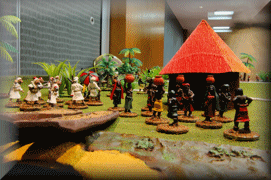 Captain Stick and Major Holdem both over-reacted I think.
Holdem might have had one too many bourbons but he claimed to have
seen Sir Hector’s baggage “moving”, drew his six-gun and started shooting.
Well that kind of behaviour might be acceptable in Dodge City but in
Darkest Africa we do things in an altogether more civilized manner.
Meanwhile Captain Stick became very officious and insisted on
inspecting the baggage. Sir
Hector was the very model of a gentleman in adversity, polite, yet firm and,
above all, uncompromising in the defence of every freeborn Englishmen’s
rights. He patiently listed all
the constitutional provisions against unlawful search or seizure stretching
back to Magna Carta, and added to this a comprehensive list of members of
Parliament and General Officers in the British army of his acquaintance who
might soon be taking an interest in Captain Stick’s career.
Captain Stick relented and Sir Hector’s half of the baggage was
allowed to go. Captain Stick and Major Holdem both over-reacted I think.
Holdem might have had one too many bourbons but he claimed to have
seen Sir Hector’s baggage “moving”, drew his six-gun and started shooting.
Well that kind of behaviour might be acceptable in Dodge City but in
Darkest Africa we do things in an altogether more civilized manner.
Meanwhile Captain Stick became very officious and insisted on
inspecting the baggage. Sir
Hector was the very model of a gentleman in adversity, polite, yet firm and,
above all, uncompromising in the defence of every freeborn Englishmen’s
rights. He patiently listed all
the constitutional provisions against unlawful search or seizure stretching
back to Magna Carta, and added to this a comprehensive list of members of
Parliament and General Officers in the British army of his acquaintance who
might soon be taking an interest in Captain Stick’s career.
Captain Stick relented and Sir Hector’s half of the baggage was
allowed to go.
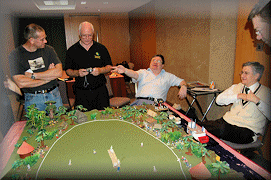 Whilst all this was going on Sir Hector steadfastly refused to bowl for his
Captain’s, Captain Stick’s team and, the loss of Hector’s seam attack, (he
later told me that he had one of the most effective middle fingers in Africa
– at least I think he was talking about cricket), led to Henri and the
intrepid Gupta Singh stemming their side’s early batting collapse and
putting on 40 runs for the final wicket, to end “77 all out”, whatever that
means. Whilst all this was going on Sir Hector steadfastly refused to bowl for his
Captain’s, Captain Stick’s team and, the loss of Hector’s seam attack, (he
later told me that he had one of the most effective middle fingers in Africa
– at least I think he was talking about cricket), led to Henri and the
intrepid Gupta Singh stemming their side’s early batting collapse and
putting on 40 runs for the final wicket, to end “77 all out”, whatever that
means.
Whilst I was administering first aid to Denys’ tender pride (out, stumped,
for only 12, runs, whatever that means, but you know how he sulks
sometimes), the gentle knock of leather against willow was rudely
interrupted by a rampaging bull buffalo.
I brought it down with one round from the Purdy, not a bad shot if I
say so myself6.
Meanwhile Colonel Von Stomp’s attempts at Franco-German bridge-building were
becoming a bit rowdy. It might
have been all the schnapps; or it might have been a rather silly German
parlour game where you tie up your guests and shout at them in German, and
your guests, because they don’t speak German, shout back in Spanish, French,
Italian and American, but it was clear that there would be “tears before
bedtime”. Both sides got
“over-excited” and a squabble broke out.
I think that they must have had a lot to drink because when one of
the long horn cattle was set off by the red trousers of the French, they all
insisted that they were being attacked by a rhino!
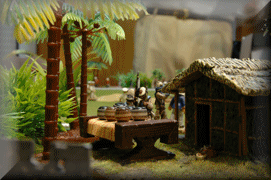 By now Maudie Atkinson’s clothes and some binding ropes had been found
inside a hut near the Arab dhow.
So perhaps the Arabs did have some explaining to do.
But if they hadn’t been Arabs I wonder if the British would have been
quite so officious: “come along
quietly Sir, we don’t want any trouble here”; or the Americans nearly so
aggressive: “Atchison alive or Arabs dead!” Holdem’s men tried to storm the
dhow, a few punches were thrown, shots fired in the air, and a muzzle
loading cannon or two let off, although no real harm was done.
But all this commotion was bound to disturb the fragile balance
between man and nature and an ill-tempered Lumbago hippo joined in the fray.
Tramping Arab and American alike the hippo settled matters by ramming
and sinking the dhow. By this
time the only people on the dhow were two US Marines with bruised knuckles
and bruised egos, and a spectacular looking native girl… certainly no Maudie
Atkinson. The American’s
abandoned the girl but it turned out that she was a good swimmer, despite
the heavy jewellery round her neck, hands and feet.
This wasn’t even gold, just iron.
I’ve never really understood their taste in decoration. By now Maudie Atkinson’s clothes and some binding ropes had been found
inside a hut near the Arab dhow.
So perhaps the Arabs did have some explaining to do.
But if they hadn’t been Arabs I wonder if the British would have been
quite so officious: “come along
quietly Sir, we don’t want any trouble here”; or the Americans nearly so
aggressive: “Atchison alive or Arabs dead!” Holdem’s men tried to storm the
dhow, a few punches were thrown, shots fired in the air, and a muzzle
loading cannon or two let off, although no real harm was done.
But all this commotion was bound to disturb the fragile balance
between man and nature and an ill-tempered Lumbago hippo joined in the fray.
Tramping Arab and American alike the hippo settled matters by ramming
and sinking the dhow. By this
time the only people on the dhow were two US Marines with bruised knuckles
and bruised egos, and a spectacular looking native girl… certainly no Maudie
Atkinson. The American’s
abandoned the girl but it turned out that she was a good swimmer, despite
the heavy jewellery round her neck, hands and feet.
This wasn’t even gold, just iron.
I’ve never really understood their taste in decoration.
 On the field Sir Hector was making up for his lack of bowling practice by
opening for England and running up a fine score with the bat.
He was soon on the way to his half-century, including eight
boundaries. I thought that I
caught a hint of a smile when his first change partner, Captain Stick, was
clean bowled first ball. But
Hector’s expression turned to consternation later, when, following one of
his “sixes” there was the most appalling shriek from the forest beyond fine
cover boundary. A few moments
later the most magnificent specimen of a man I have ever seen, blond, tanned
and very well built (his leopard skin loin cloth left little to a Danish
girl’s imagination), turned up carrying a buxom, similarly attired, and
completely unconscious woman.
This was the famous Fritz and Freda of the Forest, and it was clear that Sir
Hector’s last boundary had hit Freda for six too.
Legend has it that Fritz is the shipwrecked baby son of a German
aristocrat who has been raised to manhood by the apes.
Perhaps there is something in that, for, after gently placing the
unconscious Freda down by the boundary rope, the way that he charged towards
Sir Hector bent on revenge was very Germanic.
I’m not sure if the sight of a 6 ft 4”, 220 lb ape man armed with a
two foot machete charging towards him disturbed Sir Hector’s concentration,
or having achieved his 50 he decided, like the true gentleman that he is,
that piling up further runs would just be ostentatious, but Hector was
stumped next ball. There was an
ugly moment as Fritz raised his machete but Sir Hector, always, like a true
gent ready to acknowledge an error and right a wrong, extended a firm
handshake to Fritz and apologised for any harm done.
The two aristocrats saw eye-to-eye in chivalry and good manners, Sir
Hector escorted Fritz, and the now revived Freda, to his tent and was the
perfect host, entertaining the Forest nobility with fine wine, tasty
comestibles, and a fascinating demonstration of his over-the-wicket
leg-break, whatever that is. On the field Sir Hector was making up for his lack of bowling practice by
opening for England and running up a fine score with the bat.
He was soon on the way to his half-century, including eight
boundaries. I thought that I
caught a hint of a smile when his first change partner, Captain Stick, was
clean bowled first ball. But
Hector’s expression turned to consternation later, when, following one of
his “sixes” there was the most appalling shriek from the forest beyond fine
cover boundary. A few moments
later the most magnificent specimen of a man I have ever seen, blond, tanned
and very well built (his leopard skin loin cloth left little to a Danish
girl’s imagination), turned up carrying a buxom, similarly attired, and
completely unconscious woman.
This was the famous Fritz and Freda of the Forest, and it was clear that Sir
Hector’s last boundary had hit Freda for six too.
Legend has it that Fritz is the shipwrecked baby son of a German
aristocrat who has been raised to manhood by the apes.
Perhaps there is something in that, for, after gently placing the
unconscious Freda down by the boundary rope, the way that he charged towards
Sir Hector bent on revenge was very Germanic.
I’m not sure if the sight of a 6 ft 4”, 220 lb ape man armed with a
two foot machete charging towards him disturbed Sir Hector’s concentration,
or having achieved his 50 he decided, like the true gentleman that he is,
that piling up further runs would just be ostentatious, but Hector was
stumped next ball. There was an
ugly moment as Fritz raised his machete but Sir Hector, always, like a true
gent ready to acknowledge an error and right a wrong, extended a firm
handshake to Fritz and apologised for any harm done.
The two aristocrats saw eye-to-eye in chivalry and good manners, Sir
Hector escorted Fritz, and the now revived Freda, to his tent and was the
perfect host, entertaining the Forest nobility with fine wine, tasty
comestibles, and a fascinating demonstration of his over-the-wicket
leg-break, whatever that is.
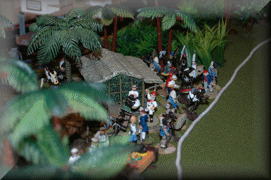 With Sir Hector out excitement on, and off, the pitch was mounting.
Captain Stick was more intent on his role as the World’s policeman
than as the captain of the team.
He was still insistent on searching the Rugga Rugga’s baggage but
this all came to a rather carnival end as some wag let off some fireworks.
At the same time the English started a hut-to-hut search for Maudie
Atkinson. This proceeded with
some efficiency until it reached Mademoiselle Fifi’s hut where confusion
ensued. It seemed that the
young lady misunderstood the purpose of the English intrusion.
They were holding a maid’s uniform which she had no objection to
donning, subject to her normal rate for “special additional services”.
Apparently Fifi has had dealings with the English before and ascribes
their tastes to the public school system.
I must ask Denys about this. With Sir Hector out excitement on, and off, the pitch was mounting.
Captain Stick was more intent on his role as the World’s policeman
than as the captain of the team.
He was still insistent on searching the Rugga Rugga’s baggage but
this all came to a rather carnival end as some wag let off some fireworks.
At the same time the English started a hut-to-hut search for Maudie
Atkinson. This proceeded with
some efficiency until it reached Mademoiselle Fifi’s hut where confusion
ensued. It seemed that the
young lady misunderstood the purpose of the English intrusion.
They were holding a maid’s uniform which she had no objection to
donning, subject to her normal rate for “special additional services”.
Apparently Fifi has had dealings with the English before and ascribes
their tastes to the public school system.
I must ask Denys about this.
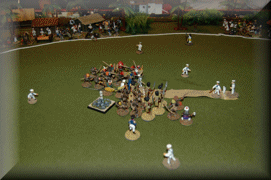 On the field the England team was “71 for 4” with the slight, working class,
lad Michael Atcheson facing, Gupta Singh.
Even I realized that the match was reaching its climax but we were
all surprised by the excitement in the crowd as the Fukawi stared a pitch
invasion. I don’t know if Henri
was annoyed at the possible interruptions or pleased that the locals had
taken the game so to heart. On the field the England team was “71 for 4” with the slight, working class,
lad Michael Atcheson facing, Gupta Singh.
Even I realized that the match was reaching its climax but we were
all surprised by the excitement in the crowd as the Fukawi stared a pitch
invasion. I don’t know if Henri
was annoyed at the possible interruptions or pleased that the locals had
taken the game so to heart.
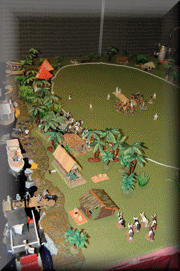 Atcheson hit the first ball of the over for 3 and the Fukawi charged
forward. His last-wicket
partner, Foppington-Smyth, facing his first ball steered it through cover
for another 3 and the game was tied.
The exuberant Fukawai diverted to avoid an ancient burial ground at
third slip and Atcheson was facing the final ball of the match.
You could see the young lad look around for the reassurance of his
“captain’s hand on his shoulder smote” but Stick was more concerned with
playing customs inspector and detective than playing a Captain’s Innings and
Atcheson was all alone. Gupta
Singh thundered in, his portly frame wound tight with guile and
determination, and unleashed his deadly googly.
Atcheson blinked the torrid sweat from his eyes, squinted into the
tropic sun lying low over the Lumbago, hesitated … then caught the line of
the ball and clipped it to the mid-off boundary for 4 and the match!
The Fukawi reached the wicket just as the Umpire removed the bails
and Chief Bugga Ui looked both annoyed at not getting the bails himself and
pleased that Jonathan Cho’ Lobotomy, the square leg umpire, hadn’t picked
them up either. Atcheson hit the first ball of the over for 3 and the Fukawi charged
forward. His last-wicket
partner, Foppington-Smyth, facing his first ball steered it through cover
for another 3 and the game was tied.
The exuberant Fukawai diverted to avoid an ancient burial ground at
third slip and Atcheson was facing the final ball of the match.
You could see the young lad look around for the reassurance of his
“captain’s hand on his shoulder smote” but Stick was more concerned with
playing customs inspector and detective than playing a Captain’s Innings and
Atcheson was all alone. Gupta
Singh thundered in, his portly frame wound tight with guile and
determination, and unleashed his deadly googly.
Atcheson blinked the torrid sweat from his eyes, squinted into the
tropic sun lying low over the Lumbago, hesitated … then caught the line of
the ball and clipped it to the mid-off boundary for 4 and the match!
The Fukawi reached the wicket just as the Umpire removed the bails
and Chief Bugga Ui looked both annoyed at not getting the bails himself and
pleased that Jonathan Cho’ Lobotomy, the square leg umpire, hadn’t picked
them up either.
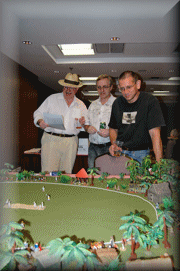 Michael Atcheson was chaired off the field by Henri’s team and the First
Equatorial Test Match concluded in a festival of fair play and bonhomie, as
the minor travails around the ground were forgotten.
And in amongst the croaking of the bullfrogs, the squawking of the
parrots, the chattering of the monkeys and the roaring of the elephant you
could, if you had had enough Pimms, or pink gins, or schnapps, or arak or
vin rouge, just think yourself back at Hove or on the Playing Fields of
Eton, not on a malarial swamp on the banks of the Lumbago, and be quite
content … Michael Atcheson was chaired off the field by Henri’s team and the First
Equatorial Test Match concluded in a festival of fair play and bonhomie, as
the minor travails around the ground were forgotten.
And in amongst the croaking of the bullfrogs, the squawking of the
parrots, the chattering of the monkeys and the roaring of the elephant you
could, if you had had enough Pimms, or pink gins, or schnapps, or arak or
vin rouge, just think yourself back at Hove or on the Playing Fields of
Eton, not on a malarial swamp on the banks of the Lumbago, and be quite
content …
Michael Atcheson had to leave early to catch his boat for the coast, and in
the revelries we nearly forgot about Maudie Atkinson until she re-appeared
and explained she had gone for a swim earlier.
She was quickly forgiven and Mademoiselle Fifi even split with her
the additional profits that the uniform had brought in.
So that is the tale of the First Equatorial Cricket Match7.
The children of the Lumbago still to this day play and sing of
“BOJOWLAY’S 12 men in white with six sticks and two clubs”.
For myself I have learnt a lot about Africa, and a little about
cricket. I can think of a nice
spot in the Ngong Hills where, if we level it off, it would make a good
wicket … Denys would like that.
***
Footnotes
1.
Well, by Peter Hunt really. But
Karen did write the quote that follows.
2.
See here
3.
Denys finch-Hatton did indeed go to Eton.
And we have it on the unimpeachable authority of P.C. Wren that Henri
De Beaujolais and the three “Geste” brothers, Digby, Michael and “Beau” did
too.
4.
De Beaujolais’ speech is here
5.
Not everyone was purely there for the enjoyment of “the summer game”, see
here
6.
Actually it was just a curious domestic cow, so Karen’s famous “shoo” word
would have been just as effective as the 12 gauge.
7.
Well almost …
My thanks go to the players.
Gentlemen all:
The Rest of the World (Old Etonians)
George:
The French and De Beaujolais – 20 runs.
Jeff:
The Germans; Gupta Singh – 20 not out and 0 for 34; and Finch-Hatton
– 12 runs.
Ken:
The Arabs and Digby Geste – 11 runs and 1 for 36.
Dave:
The Lobotomi and Michael Geste – A duck and 2 for 10.
James:
The Rugga Rugga and Beau Geste – 14 runs.
England
Andrzej:
The British; Stick – A duck; and Foppington-Smyth – 3 not out and 2 for
27.
Glenn:
Brandon – 50 runs.
Peter M:
The Fukawi and Watermain – A duck and 0 for 21.
Frankie: The Americans and Bombhead – 6 and 2 for 27.
Yours Truly:
Atcheson – 22 not out and 1 for 3.
Special thanks go to Frankie for the Pimms and Glenn for the Pink Gin and
comestibles; and to Andrzej and Jeff for the toys, especially the men in
white.
The rules used were “Owzthat” for the cricket and “In the Heart of Africa”
for everything else, both laced with special event cards, except that we
hadn’t played a colonial game since the turn of the century and I had
forgotten most of the rules, so I just waved the quick reference sheet
authoritatively and made things up.
Nobody seemed to notice, and if they did, they didn’t seem to mind …
back
to colonial wars
|